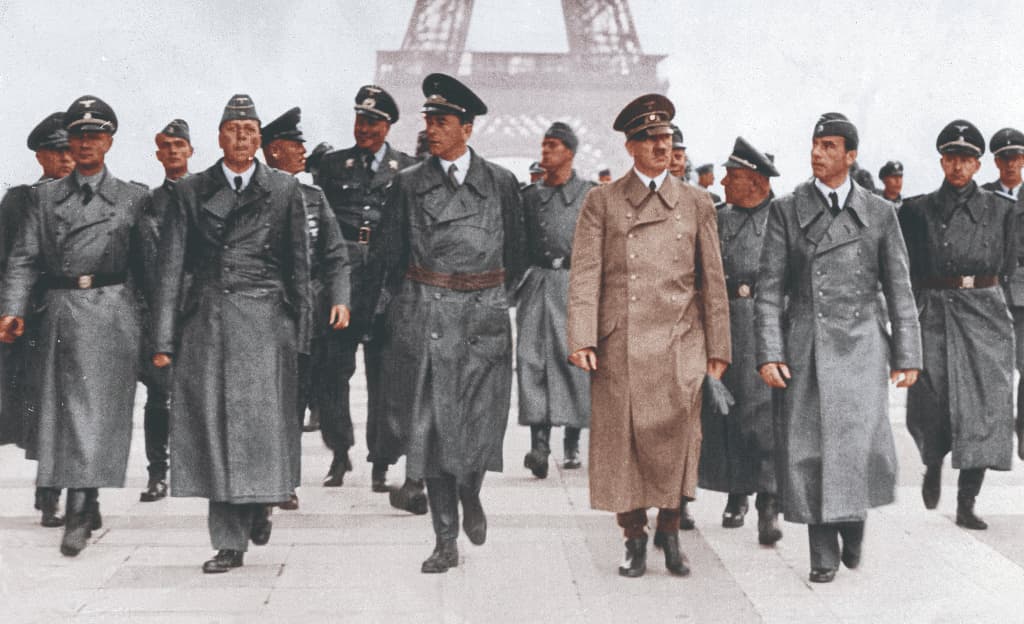Collaborationist activity, judged by some as a necessary evil, flourished during the Nazi occupation of the City of Light.
Once, during the Nazi occupation of Paris, a German officer made his way to the attic of 7 Rue des Grands-Augustins, home and studio of the Spanish artist Pablo Picasso. Picking up a postcard reproduction of “Guernica,” Picasso’s commemoration of the Basque civilians killed by the Luftwaffe in 1937, the officer asked, “Did you do this?” Picasso replied, “No, you did.”
Even if this story is apocryphal, it is undoubtedly true that Picasso occasionally hid fugitives from the German authorities and gave money to one or another resistance group. Throughout the war he collected propaganda clippings that denounced him with such phrases as “Picasso the Jew,” “the decadent Pablo Picasso,” and “the obscene pornographer.” During the liberation of Paris it is said that the fighting became a part of his paintings. Amid a series depicting a tomato plant, in one picture the sky seen out his window becomes yellowish, that afternoon being the day the Allies destroyed a fuel depot. And as the fighting on the street below became even more intense and the Allied victory was certain, he took to painting “The Triumph of Pan.”
None of this would have been possible had Picasso not remained in Paris, where he had been living for nearly four decades. His mistress, Françoise Gilot, remarked, “What would have changed if Picasso, who certainly was no good with armaments, had thrown a grenade? Nothing. No, his position was being against the Germans and staying in Paris. For people of my generation, that symbol was very important. Just by being there and not losing our dignity, you could do certain things.” Similarly, when war broke out the guitarist Django Reinhardt had been traveling with his band in London, but he preferred Paris and returned there immediately. As artist Henri Matisse wrote to his son in New York, “If everything of any worth flees, what will remain of France?” Indeed, from June 1940 to August 1944, millions of others also remained in Paris, and in reflecting on just how they did so—bought bread, rode the Metro, went to the theater, or just walked down the street amid a Nazi presence—the difficulty of everyday life reveals itself.
As the exodus from the city began ahead of the advancing Germans, the Paris Opera closed its production of Berlioz’s La Damnation de Faust on June 5, 1940. Nearly three months later, Paris was an open city and millions who fled had returned; the Paris Opera reopened with the same Berlioz on August 24, but now to a French and German crowd. The ease with which this and other forms of cultural life reasserted themselves, or just how easily life went on, now with Germans everywhere, seems to have embarrassed everyone. A teenager wrote in her diary during the war: “It is ignoble to become accustomed to seeing the German cross flying over the Chamber of Deputies; nonetheless we did become used to it.”
The situation was ready-made for the Nazis, who, as ever, were keen exploiters of human frailty and need; and so, in Paris as elsewhere, their victims were put in a position that implicated themselves in their own subjugation. Faced with a seemingly indefinite occupation, a columnist in La Gerbe wondered why Parisians should be condemned “because we try to forget our sorrows, and their piteous burden, by going to see a show.” Hitler himself seems to have enjoyed their difficulties, remarking to his architect, Albert Speer, “Does the spiritual health of the French people matter to you? Let’s let them degenerate. All the better for us.” While it seems regrettable that until 1942 the Germans required only 30,000 men to watch over the entirety of France, as with other aspects of everyday life that seem at first easy to judge, beneath each is a greater complexity. A recent writer lists only a few of the unanswerable questions, repeated every hour of every day for four years: “Should a woman reject a seat offered by a German in the Metro? Should one have refused to receive civilized, non-Nazi Germans whom one had known before the war? Should one have turned one’s back on a German friend in a public place?”
And so, in those early months of the occupation, movie theaters reopened, but American and British films were banned and only the lightest French fare was allowed to be shown or produced. The Louvre was partially reopened, but other propaganda exhibits (whether anti-Semitic, or against Freemasonry or Communism) also opened in the city, and throughout the war years these exhibits also toured the rest of the country. And on October 3, 1940, the Statute Against Jews was promulgated, excluding them from being teachers or working in the government, civil service, or the press. It was another two years before they were no longer allowed to appear on stage and were required to wear the yellow star.
A teacher herself, the philosopher and novelist Simone de Beauvoir signed a paper under oath declaring she was neither Jewish nor a Freemason. “I thought it repugnant to sign, but no one refused: for most of my colleagues, as for myself, there was no way of doing otherwise.” At the same time, the Paris-Soir was jubilant at the statute, with such headlines as “The Purification Begins: Jews at last expelled from all public jobs in the country.” As would later be asked, surely there was a large gap between teachers keeping their livelihoods rather than resigning in protest (and no doubt helping their students grapple with the situation) and rags like the Paris-Soir, which reflected the worst of French anti-Semitism.
Paris nightlife also carried on as the brothels, cabarets, and music halls all performed for their unwelcome guests. But on any given night it could all be subtly undermined; comedians were known to fill their acts, already in French, with slang and argot the Germans would never catch, even as very few spoke out against the occupation directly. Similarly, Josephine Baker performed for German audiences just as she had for Parisians, yet a French intelligence officer posed as her secretary, and when she traveled to Lisbon she was able to pass sensitive information on German troop movements, written in invisible ink on her music scores.
The career of singer Edith Piaf during the war provides another example of ambiguity. She was popular with Parisians as well as German officers, singing for the latter in some of the finest venues in the city. Her success allowed her to live in a luxury flat above the L’Étoile de Kléber, a famous nightclub and bordello close to the Paris Gestapo headquarters. This, along with her Berlin concerts sponsored by German officials in 1943 and 1944, led to accusations of collaboration. In a post-war hearing to avoid being banned from the radio, Piaf and her personal secretary, Andrée Bigard (who claimed to be in the French Resistance), testified about their involvement in a plan to help French POWs obtain identity documents to aid in their escape. No action was taken against Piaf, who sang for Allied forces in Marseille in December 1944. However, there is no indication that Piaf sought out opportunities like this, or that she was thinking of anything but her own career. There is evidence she helped some of her Jewish friends, especially financially, but her claims of helping prisoners in Berlin comes only from her and Bigard. She saw no reason to cease performing during the occupation, and her remark in 1940—“My real job is to sing, to sing no matter what happens”—can be interpreted a dozen ways. But then, would any men she did help have cared about her motives?
Without knowing of these schemes, both Baker and Piaf could have been slandered for dealing politely with the German authorities. Yet anyone who went out to lunch in Paris could have been accused of the same, since German bands or choirs frequently performed outside the Paris Opera; other times, Parisians sunning near the Luxembourg Gardens could also enjoy a German brass band. As one scholar has said, none of these crowds approved of the occupation; instead, they were drawn “by the magnet of music.” In July 1941, the composer Francis Poulenc said as much: “Musical life is intense and everyone finds in it a way of forgetting the present sadness.”
Were those who saw concerts or sunned themselves, were those who went shopping or just laughed out in public, somehow giving their tacit approval to Vichy and the occupation? Did one’s attachment to culture and a brief need to forget encourage or cancel out more obvious instances of collaboration? Because there were always men like the French pianist Alfred Cortot, who during the occupation toured France and Germany and played with German orchestras and was even congratulated for his “useful act of collaboration.” At the same time, however, Jacques Rouché, musical director of the Paris Opera, was forced to fire 30 Jewish musicians, even as he con- tinued to pay them for another two years. Similarly, the Society of Auth-ors, Composers and Editors of Music (SACEM) did the same for the Jewish composers they had dismissed, or the wives of those who had been deported.
To all outward appearances Piaf, Baker, Rouché and SACEM were collaborating—leading to two questions: how could everyday civilians, without their influence or prominence, pretend to do otherwise? Or, was Paris riddled with multiple layers of subterfuge, with most people knowing who was “really” collaborating and who was only doing so to achieve other ends?
For a country that prides itself on its writers and thinkers, France’s authors and publishers had it worse than other media in many ways. As might be expected, the most eloquent voice on the topic was unknown during the war years, until the writer Jean Guéhenno’s Diary of the Dark Years was published in 1947 (It wouldn’t appear in English until 2014). Constantly railing against the weakness of his fellow authors and refusing himself to publish a word during the occupation, he wrote of those who appeared in print under the Nazi censor: “The man-of-letters species is not one of the greatest species in the human race. The man of letters is unable to live out of public view for any length of time; he would sell his soul to see his name ‘appear.’ A few months of silence, of disappearance, have pushed him to the limit. He can’t stand it anymore. All he quibbles about now is the size or font of the characters that will print his name, or his place in the table of contents. Of course he’s chockfull of edifying reasons: ‘French literature must go on,’ he says. He thinks he is French literature and French thought, and they would die without him.”
Yet elsewhere Guéhenno admits that he was “lucky enough not to be obliged to write for a living … [and so] if you weren’t absolutely obliged to ‘appear’ because of the need to earn a living, the least you could do was hide.” But what, indeed, about those citizens who had no other source of income like those Parisian women who slept with Germans in return for rations or other favors for their children and families. The difficult questions remain. In August 1941, Guéhenno himself said of the occupation, “There is nothing we can do now, and there will be nothing we can do for a long time to come.” Nothing, that is, except staying alive to live day to day until a better moment. And how exactly should one do that?”
Guéhenno is especially harsh on new writers, who he sees as opportunists rushing in to fill a void left by those with “standards.” Yet what could the then-unknown Albert Camus do, when his Myth of Sisyphus was published in 1944, but remove the positive mention of a Jewish writer (Franz Kafka) at the censor’s command? And if his acquiescence was unfortunate, did the prominence the book gave him, alongside his work in the Paris theater during the occupation, his editing of the underground newspaper Combat, and his postwar role as voice for morality and conscience justify “collaboration” in this form? The journalist and novelist Colette, who wrote her most famous work, Gigi, during the war years, contributed to collaborationist and even pro-German newspapers, all while hiding her Jewish husband in their Palais Royal apartment. Was this simply what was necessary?
What Guéhenno would not allow, his fellow writers nevertheless became a gold mine when he observes the small gestures of everyday Parisians. “Faces in the Metro were morose. But could we know what that seamstress was carrying in her handbag, between her lipstick and her compact? That ordinary-looking package a young student had set down on the floor next to her was a radio transmitter, lists of airdrops, mail from London, or weapons.” Elsewhere, he observes with pride a blind man outside the Metro playing the Marseillaise on his accordion, and Guéhenno remarks that everyone who passes “thinks he is being revenged by this blind man,” since the Germans, because of his infirmity, refuse to make him stop. Another time, he has his own moment of triumph, in this encounter with a German soldier, who he only addresses honestly back home and in his diary: “[Y]ou were wandering around like any lost little soldier, looking for Notre-Dame cathedral. So I condescended to understand you, and with a gesture, without saying a word, I pointed to the towers rising in the sky on the other side of the river, staring you in the face. You felt stupid, you blushed, and I was glad. It has come to this.” He also records a similar encounter of a lost soldier, whose French guide gives up with the words, “Poor guy. Man, are you dumb. What the hell are you doing here? It’s too complicated for you.”
And yet after smiling over stories like that, the dumb soldier remained, and the French remembered that he was there because they had surrendered. It becomes empowering but then slightly pathetic to find pride in a fellow Frenchman refusing a cigarette when it is offered by a German. At times this was the best they could do; at others, Guéhenno brings every caustic remark back on himself. “The worst is that we manage to live in it. Toward the end of a meager meal, we turn the dial on the radio. We calmly listen to them say that fifty-five hostages were shot in Lille, two divisions were exterminated in Russia, Malta has just undergone its 2,000th bombing, etc. …Then we savor that drop of wine we had been saving for the end of the dinner, we keep it in our mouths for a long time, dreaming of wine cellars and barrels; finally we make up our minds to swallow it…. I am ashamed of this monstrous apathy. Have I forgotten? I know, however. I saw men die. Could I no longer feel anything of that immense pity I was filled with at the age of twenty-five? Have these past twenty-five years worn away all our humanity?”
This feeling of both weakness and guilt, powerlessness coupled with self-laceration, went on for four years. Should anyone feel so bold as to join the resistance groups that began cropping up, the fate of those who were caught was never far away. In early December 1943, Guéhenno described an evening walking on the Boulevard Saint-Michel, when suddenly he heard the Marseillaise being sung. “It was prisoners being taken in police wagons to Fresnes or the Santé. A few people on the sidewalk barely stopped to watch them go by. It’s true that night was already protecting us, but the black-uniformed police were watching. I hope the people were at least clenching their fists in their pockets.”
One of the resistance members who was on the inside of another of these convoys later wrote: “What a contrast: as we were going toward our deaths, thousands of people were enjoying the August sunshine and sitting idly at sidewalk cafés. A few noticed us, and I remember seeing, through the slats in the side of the truck, some horror-stricken Parisians watching our convoy pass. A few women were weeping.” Even the most strident forms of waiting it out or patient subterfuge must have crumbled at scenes like these.
The fates of women and children during the occupation are among the most difficult. Many French children were overawed by the uniformed Germans, who made it easy by giving them looted chocolate. With evidence of their country’s capitulation all around them and surrounded by German propaganda posters—one of which declared, “Abandoned population, put your trust in German soldiers!”—how could they not? As one Frenchman remembered from his childhood, “What adolescent of my generation did not dream, even if only briefly and shamefully, of being a young, twenty-year-old SS soldier, leaning on his tank, spreading butter on his bread with his dagger?”
Almost immediately after returning to Paris after the exodus, Simone de Beauvoir overheard a Frenchman speak openly, even with a grin, about French women sleeping with German soldiers and there now being “some little Germans in the works.”
“I heard this sentence ten times,” she writes, “and never did it carry any blame.” However, around the same time, 15-year-old Flora Groult referred to French women flirting with Germans as “bitches in heat.” With so many husbands, fathers, and older sons imprisoned in Germany, it should come as no surprise that an estimated 80,000 to 200,000 babies were born during the occupation to French mothers and German fathers. Dubbed enfants maudits, “accursed children,” they were shamed on all sides, since the Wehrmacht forbade such relationships just as much as the French eventually came to. Whore houses were one thing, and perhaps many Germans knew some of them were fronts for spies looking for information, but it is not so unlikely that men and women on both sides, amid a daily life everyone became inured to, and during which only certain groups were singled out for punishment, that relationships might spring up.
One German officer, Gerhard Heller, fondly recalled liaisons with a French teenage girl and later with a teenage boy. With the girl there were bicycle rides through the country and walks through the city, while his later time with the boy was understandably more covert. That both were willing to risk a homosexual affair speaks to the loneliness many must have felt on both sides during the occupation.
After a while, many forms of what might be called civil disobedience began to appear: the Metro and sewers (and no doubt Paris’s famous catacombs) became places to hide and retreat or have a bit of fun away from the German authorities, who seem to have mapped out everything above ground but never got their bearings beneath it. The French also came to the defense of their Jewish neighbors when the latter were forced to wear the yellow star. The young made their own stars with the words SWING, GOI, or INRI; this while, when a Nazi refused to ride in the first-class Metro train until a Jewish woman vacated it, he was left alone in the car when everyone else followed her out.
There must have been thousands of such small gestures, but by the end of the occupation it was not enough to assuage the guilt Paris seemed to feel as a whole for what had gone on. A month before Paris was liberated, a German soldier, Walter Dreizner, wrote, “Paris is increasingly becoming a trap for the Germans,” but for months after, perhaps even now, it remained a trap for the French as well. The so-called épuration sauvage (the unofficial purge) saw some 10,000 die as old scores were settled in the general melee, political enemies murdered and thrown in the Seine, while women who had slept with Germans were publicly humiliated, tarred with swastikas, their heads shaved, and led down the street to meet with further abuse. No such punishment seems to have been meted out to men who slept with German women stationed in Paris.
Perhaps some 20,000 women were punished this way, although a woman’s fate also depended, as ever, upon her means. The American socialite Florence Gould, whose aging French husband spent the war years in the south, held a famous weekly salon at her apartment, frequented by dozens of people, French and German. During the war years she had a handful of lovers, some German, but after the war she also had the money and influence to evade punishment. The French actress Arletty, who was unapologetic if not proud of having had a German lover, defended herself with the memorable statement, “My heart is French but my ass is international.” While she was briefly imprisoned after the war, she quickly resumed her acting career and, following her death in 1992, she was condemned less for having a German lover than “dining at the Ritz while the rest of France was going hungry.” If only other French women had been treated the same.
The more official purge ended with the trials and punishments (and sometimes executions) of more notable public figures, beginning with Vichy officials but eventually sweeping writers and cultural figures into the mix. Of the entire affair, Jean Galtier-Boissière said, “The Nazis have left us an imprint of authoritarianism and persecution.” Rather than going too far, the authorities rather seem to have realized that such investigations would be endless, and they discovered what most French citizens had known for years. Barring insight into another’s soul or conscience, or just of their every movement in June 1940, there were no calculations that could definitively categorize one form of collaboration as understandable and another as criminal.
And even if there were, punishing all those determined to deserve it would only hinder the country’s attempt to emerge from the war. As Galtier-Boissière put it, “One forgets that some of [the collaborationist writers] had only their pen with which to feed their family and wrote only anodyne pieces. Does one reproach the workers at Renault for making tanks for the Wehrmacht? Wasn’t a tank more useful to the Fritz than an item in Le Petit Parisien?” Indeed, for French industrial life to begin its postwar existence factory managers and workers who had been employed by the Germans couldn’t be punished; and in the same way, many police officials, magistrates, and civil servants, who had all served either Germany or Vichy, were needed on the streets and in the courtrooms and offices if life were return to “normal.” When Baron de Rothschild returned to his Paris mansion after the war and asked who had come to visit the Germans living there while he had been imprisoned, the unsettling answer was, “The same ones who came when you were here.” Normal life would have to go on with the knowledge that it was likely compromised.
But wasn’t it always, to some degree or another? Jean Guéhenno justified what happened the only way that he could. “Defeat can prove to be the only way to resurrection, despite its ugliness.” A pacifist following the apparently senseless and total slaughter of World War I, it took the occupation to change his mind, if only slightly, in words that appear in his diary only a few days after the Germans marched into Paris: “I will never believe that men are made for war. But I know they are not made for servitude, either.”
Four years of day-in, day-out interactions with the occupying Germans had tested everyone’s belief in their own dignity, and it was hard not to feel that sometimes servitude is where they had ended up. In the same way, after a time Camus refused to support the purge of French citizens, writing, “The greatness of man lies in his decision to be stronger than his condition.” He seemed to understand that even this greatness meant occasional, and distasteful, compromise.
That French people worried over gestures and interactions small and large, and that they still had a conscience that nagged them at all, was actually quite encouraging. They had not become like their enemies after all. Perfect worlds and pure races, ideal conditions and clear lines—leave those to the authoritarians who thought them possible.
Simone de Beauvoir described postwar life as Paris in “the year zero.” They could begin again, but no one had the luxury of believing it would be easy.
* Tim Miller, who lives in Pittsburgh, last wrote for WWII History on the extensive spy network that operated in occupied Paris.
Source: https://warfarehistorynetwork.com/article/paris-under-the-swastika/






